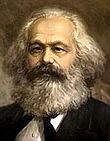- Socialism (Marxism)
-
This article is about socialism as a historical evolutionary stage of development in Marxist theory. For the broad concept of socialism as an economic system, see Socialism.For the Marxist perspective of socialism as a basis for understanding social and economic development, see Scientific socialism.
Socialism  DevelopmentIdeasEconomic planning · Free association
DevelopmentIdeasEconomic planning · Free association
Equality of opportunity Economic democracy
Adhocracy · Technocracy
Self-management · Direct democracy
Public ownership · Common ownership
Social dividend · Basic income
Production for use
Calculation in kind · Labour voucher
Industrial democracy · Collaboration
Material balance accounting
Social ownership · EconomicsPeopleCharles Hall · Henri de Saint-Simon
Robert Owen · Charles Fourier
William Thompson
Thomas Hodgskin
Louis Blanc · Moses Hess
Karl Marx · Friedrich Engels
Ferdinand Lassalle
William Morris · Mary Harris Jones
Eugene V. Debs · John Dewey
Enrico Barone · Ben Tillett
Edvard Kardelj · Robin Hahnel
Michael AlbertSocialism portal
Politics portalIn Marxist theory, socialism, or the socialist mode of production, refers to a specific historical phase of economic development and its corresponding set of social relations that eventually supersede capitalism. Socialism is a mode of production where criteria for economic activity is use-value and direct production for use through conscious economic planning, where monetary relations in the form of exchange-value and wage labor become irrelevant. Socialism is characterized by the working-class's effectively controlling the means of production and the means of their livelihood either through cooperative enterprises or public ownership (with the state being re-organized under socialism) and self management.[1]
Contents
Mode of production
Socialism is a post-commodity economic system, meaning production is carried out to maximize use-value (to directly satisfy human needs, or demand) rather than to exchange on the market to generate a profit (to maximize exchange-value). The stage in which the accumulation of capital was viable and effective is rendered insufficient at the socialist stage of social and economic development, leading to a situation where production is carried out independently of capital accumulation in a planned fashion.
Planning can refer to democratic participatory planning, industrial democracy or administrative economic planning. Instead of relying on the coercive forces of the market to compel capitalists to produce use-values as a byproduct in the pursuit of exchange-value, socialist production is based on the rational planning of use-values and coordinated investment decisions to attain economic goals.[2] As a result, the cyclical fluctuations that occur in a capitalist market economy will not be present in a socialist economy. The value of a good in socialism is its physical utility rather than its embodied labor, cost of production and exchange value as in a capitalist system.
The advanced stage of socialism, referred to as "upper-stage communism" in Marxist theory, is based on the socialist mode of production but is differentiated from socialism in a few fundamental ways. While socialism implies public ownership (by a state apparatus) or cooperative ownership (by a worker cooperative enterprise), communism would be based on common ownership of the means of production. Class distinctions based on ownership of capital cease to exist, along with the need for a state. A superabundance of goods and services are made possible by automated production that allow for goods to be distributed based on need rather than merit.[3]
Intermediate phases
The period in which capitalism becomes increasingly insufficient as an economic system and immediately after the proletarian conquest of the state, an economic system that features elements of both socialism and capitalism will probably exist until both the productive forces of the economy and the cultural and social attitudes develop to a point where they satisfy the requirements for a full socialist society (one that has lost the need for monetary value, wage labor and capital accumulation). Specifically, market relations will still exist but economic units are either nationalized or re-organized into cooperatives. This transitional phase is sometimes described as "state capitalism" or "market socialism".
Social relations
As a set of social relationships, socialism is defined by the degree to which economic activity in society is planned by the associated producers, so that the surplus product of the population is controlled by a majority of the population through democratic processes. The sale of labor power is abolished so that every individual participates in running their institution and no one controls anyone else.[4] The incentive structure changes in a socialist society given the change in the social environment, so that an individual laborers' work becomes increasingly autonomous and creative, creating a sense of responsibility for his or her institution as a stakeholder. The individual is no longer alienated from his or her work; work now becomes a means by which the individual fulfills his or her humanity (pursues his or her interests).
Inequality and incentive-based systems would still exist under socialism, but to a diminishing extent as all members of society are de facto workers. This eliminates the severity of previous tendencies towards inequality and conflicts arising from these.[5] The method of compensation and reward in a socialist society would be based on an authentic meritocracy, along the principle of "from each according to his ability, to each according to his contribution".[6]
Role of the state
In Marxist theory, the state is a mechanism dominated by and utilized in the interests of the ruling class to subjugate other classes, to legitimize the existing socio-economic system and to promote the interests of the dominant class.[7] After a workers' revolution, the state initially becomes the instrument of the working class. Conquest of the state apparatus by the working class must take place to establish a socialist system. As socialism is built, the role and scope of the state changes as class distinctions (based on ownership of the means of production) gradually deteriorate due to the concentration of means of production in state hands. From the point where all means of production become state property, the nature and primary function of the state would change from one of political rule (via coercion) over men by the creation and enforcement of laws into a scientific administration of things and a direction of processes of production; that is the state would become a coordinating economic entity rather than a mechanism of class or political control, and would no longer be a state in the Marxian sense.[8]
See also
- Capitalist mode of production
- Communism
- Economic planning
- Marxism
- Marxian economics
- Mode of production
- Post-capitalism
- Production for use
- Relations of production
- Scientific Socialism
- Socialism
- Socialist economics
- Socialization of production
Notes
- ^ http://marxists.org/glossary/terms/s/o.htm#socialism
- ^ Market Socialism: The Debate Among Socialists, by Schweickart, David; Lawler, James; Ticktin, Hillel; Ollman, Bertell. 1998. From "The Difference Between Marxism and Market Socialism" (P.61-63): "More fundamentally, a socialist society must be one in which the economy is run on the principle of the direct satisfaction of human needs...Exchange-value, prices and so money are goals in themselves in a capitalist society or in any market. There is no necessary connection between the accumulation of capital or sums of money and human welfare. Under conditions of backwardness, the spur of money and the accumulation of wealth has led to a massive growth in industry and technology...It seems an odd argument to say that a capitalist will only be efficient in producing use-value of a good quality when trying to make more money than the next capitalist. It would seem easier to rely on the planning of use-values in a rational way, which because there is no duplication, would be produced more cheaply and be of a higher quality."
- ^ Karl Marx - Critique of the Gotha Programme. 1875 Full Text. Part 1: "In a higher phase of communist society, after the enslaving subordination of the individual to the division of labor, and therewith also the antithesis between mental and physical labor, has vanished; after labor has become not only a means of life but life's prime want; after the productive forces have also increased with the all-around development of the individual, and all the springs of co-operative wealth flow more abundantly -- only then then can the narrow horizon of bourgeois right be crossed in its entirety and society inscribe on its banners: From each according to his ability, to each according to his needs!"
- ^ Market Socialism: The Debate Among Socialists, by Schweickart, David; Lawler, James; Ticktin, Hillel; Ollman, Bertell. 1998. From "Definitions of market and socialism" (P.58-59): "For an Anti-Stalinist Marxist, socialism is defined by the degree to which the society is planned. Planning here is understood as the conscious regulation of society by the associated producers themselves. Put it differently, the control over the surplus product rests with the majority of the population through a resolutely democratic process...The sale of labour power is abolished and labour necessarily becomes creative. Everyone participates in running their institutions and society as a whole. No one controls anyone else."
- ^ http://www.economictheories.org/2008/07/karl-marx-socialism-and-scientific.html
- ^ Critique of the Gotha Programme, Karl Marx.
- '^ Definition of 'State, on Marxists.org: http://marxists.org/glossary/terms/s/t.htm#state: "The state is the institution of organised violence which is used by the ruling class of a country to maintain the conditions of its rule. Thus, it is only in a society which is divided between hostile social classes that the state exists."
- ^ Socialism: Utopian and Scientific, on Marxists.org: http://www.marxists.org/archive/marx/works/1880/soc-utop/ch01.htm: "In 1816, he declares that politics is the science of production, and foretells the complete absorption of politics by economics. The knowledge that economic conditions are the basis of political institutions appears here only in embryo. Yet what is here already very plainly expressed is the idea of the future conversion of political rule over men into an administration of things and a direction of processes of production."
Wikimedia Foundation. 2010.

